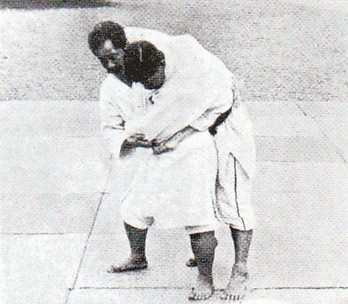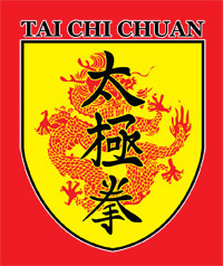 I find the UFC distasteful – it’s too excessive, and put simply, I don’t quite see the point, but I have my wacky theories about how this stuff fits in. Does my distaste for the UFC (Ultimate Fighting Championship) make me a girly-man? Do I care? No. In the 1880s Judo was born. People talk these days as if Jujutsu (in its various styles) is the traditional form, and Judo is the simplified – and therefore inferior – sporting equivalent. But Jujutsu was a military system. If you were training a warrior or soldier class, what makes sense to me is to give them a competition with strict rules where the risk of injury or damage is relatively low. In competition you can tell if a practitioner is skilful, if they can endure a certain degree of stress – mental and physical – if they’ve been training and if their training serves them properly – you can tell if they have a deep and practical understanding of their art. The actual training they would be doing – military training – would not be limited to what yields competitive success – it would include a whole bunch of other stuff that would only be applicable on the battlefield. And you’d test that in other ways, ways which didn’t run the risk of crippling your pool of best warriors. What competition does not reveal is that someone can never be beaten, that they’re the best around and blah blah blah. That’s total delusion. Competition reveals skilfulness. The benefit of competitive combat is to evaluate your skills and ability to execute techniques effectively while under stress. Not executing your lethal “I can kill a man five times before he hits the ground” techniques doesn’t mean you don’t know them or you can’t apply them – it just means you recognise the purpose of competition and you acknowledge that getting hugely injured in competition ultimately might not serve your goals.  In tai chi chuan, the competitive-combat aspect of the art is called “push hands”. Two participants press against each other’s hands and arms, and the objective is simply to make the other person lose balance or fall. There’s no striking so it’s incredibly low-impact and relatively gentle, but what it does reveal is who is more skilful in their understanding of force, their application of leverage, and the subtleties of their art. Oh my God it’s so subtle. And so difficult! And so, it’s really very revealing. When a combatant participates in a sport with rules it doesn’t mean the practitioner is naive or the training methods are inadequate – because what you see is not the entirety of how they train. Punching someone in the head fifteen times while they’re laying on the ground might be necessary in warfare, but to do so in a competition proves nothing – it doesn’t reveal a person as possessing of skill or a deep understanding of the practical application of their training. Of course, the stakes aren’t really high in tai chi push hands – unless maybe there’s a lot of money riding on the outcome? So it mightn’t reveal how you truly handle stress? But what can? It’s training. It’s part of a process. Competition is part of a process of training and development, more than an outcome. Many martial artists only practice the sport-versions of their arts, or their system might appear incomplete for some other reason, or they are aware of their failure to master particular techniques or attitudes, and so they become aware of gaps – they experience doubts – they don’t know how this stuff would apply “in the real world” – that’s how it was for me. Or their fears are exploited – “some random dude in an alley might attack you so you’ve gotta know how to punch him in the throat” – but who’s really going to do that to a stranger? Who can summon the iron will and resolution to wilfully harm a stranger – even an aggressor – without reservation or hesitation? And should we be encouraging that? Or to put it another way – how do you develop the ability to make quick and accurate judgements while under pressure? How do you train for that? And what about the reality that people in martial arts schools seldom talk about – if you need to protect yourself, it’ll most likely be from someone you know. And what kind of harm are you prepared to inflict on someone you know? What happens next? What are the consequences of action or inaction, and how can you decide what is right in a mere instant? There was a shooting in a school a while ago. Someone said if the teacher had had a gun, she could have stopped the gunman right there. But simply owning a gun and keeping it at school doesn’t magically give you the skill to act decisively when surprised, it won’t make you a willing participant in the destruction of another human – it’s not going to somehow make you capable of making all the ‘right’ choices in a split-second. You don’t develop those skills by going to a gun range for fifteen years – you could develop surgical accuracy – but seriously? How does a civilian develop the kinds of skills that will enable them to kill someone without hesitation? Of course for purposes of this discussion I’m ignoring the weak argument that more guns = less death. Anyway, owning a knife doesn’t make you a chef. If your training feels incomplete (and there’s no perfect system), or if all you train for is competition – raising the stakes of the competition will give you a feeling that your training is more bad-ass, more relevant to “real life” – but in real life people have weapons and friends, so this one-on-one almost-rule-free UFC thing is still contrived. I wonder if anyone will ever create some sort of competitive group-brawl fight thing? I hope not, but who knows? If you’re a martial artist, you might wish to know how you “really” cope under pressure, and if you’re really capable – or if you’re not. The thing is – there have been circumstances in my life when I failed in the face of adversity, and there have been circumstances in my life when I succeeded. Where’s the thread of success? Few of these involved physical-out-of-the-ring confrontations. How do you train the ability to succeed in the face of adversity? How do you really know what mind-set is appropriate or beneficial? How do you know if your physical skills will abandon you or not? People talk about mental toughness these days – but mental clarity is more important. Being mentally tough enables you to stick to your guns even if in your heart you know you’re on the wrong path. Mental clarity – now that’s useful. There have been stressful times in my life when I was all deer-in-the-headlights-startled, and times when I could act. Competition helps to an extent, but it also confuses – and when the contrivance is not recognised, the illusion is that you’re fine – that you’ll always be fine. “I handled this stressful situation, therefore I can handle all stressful situations”. Unfortunately, you never know. You never know if you’ll be able to handle what life throws at you. Because the world is chaotic, and we don’t control chaos, we respond to it, we endure it, we live with it – but people talk as if they know. “Oh, I’d totally be all blah-de-blah” – lies or delusion. Maybe you’re physically capable. Maybe you’re mentally capable. Maybe there’s some variable you haven’t considered. I’ve got enough self knowledge to know I don’t know. Putting yourself in stressful situations teaches you about yourself. But how much can you extrapolate from that? Lifting weights at the gym, or entering a fighting competition – where you ultimately know you’re safe – how does that relate to a situation where safety is not assured? And is that where the appeal of the UFC lies? Because you don’t know how far it’ll go? Clearly they’re skilful, but why so much, so far? I can’t help thinking that’s not what you’d do if actual combat really was on the cards for you. So the choice to endure hardship? Do you need to seek it out – or will life give you enough opportunities to test yourself anyway? Do you want to be a bit prepared? Feel more confident? Competition isn’t the real test. It helps you learn and assess your skills, but it doesn’t make you invincible. A black belt in martial arts represents proficiency, not mastery, but either way there’s no guarantee that nobody’s ever going to walk up behind you and hit you with a folding chair. And losing a fight doesn’t mean you fail as a martial artist. When life tests you –maybe you’ll rise to the occasion and maybe you won’t. How do you prepare yourself for that? What sort of life do you want to live? And if all your training is motivated by fear – by the need to feel prepared – you can get pretty skilful, but for what? What life will you be living? Competition needs to be a microcosm. You need to be aware of the artifice, because if you start believing that your competition is more real than someone else’s, you’ll fall prey to delusion and hubris. We are sold illusions as if they were real life. But that’s nothing new.
2 Comments
Michellers
2/21/2013 03:13:21 am
"There was a shooting in a school a while ago. Someone said if the teacher had had a gun, she could have stopped the gunman right there. But simply owning a gun and keeping it at school doesn’t magically give you the skill to act decisively when surprised, it won’t make you a willing participant in the destruction of another human – it’s not going to somehow make you capable of making all the ‘right’ choices in a split-second. You don’t develop those skills by going to a gun range for fifteen years – you could develop surgical accuracy – but seriously? How does a civilian develop the kinds of skills that will enable them to kill someone without hesitation? Of course for purposes of this discussion I’m ignoring the weak argument that more guns = less death. Anyway, owning a knife doesn’t make you a chef."
Reply
Chris Serong
2/21/2013 06:29:23 am
Thank you!
Reply
Leave a Reply. |
